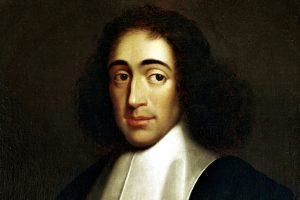Steven Nadler at the TLS:
 Among the boldest elements of Spinoza’s philosophy is his conception of God. The God of the Ethics is a far cry from the traditional, transcendent God of the Abrahamic religions. What Spinoza calls “God or Nature” lacks all of the psychological and ethical attributes of a providential deity. His God is not a personal agent endowed with will, understanding and emotions, capable of having preferences and making informed choices. Spinoza’s God does not formulate plans, issue commands, have expectations, or make judgments. Neither does God possess anything like moral character. God is not good or wise or just. What God is, for Spinoza, is Nature itself – the phrase he uses is Deus sive Natura – that is, the infinite, eternal and necessarily existing substance of the universe. God or Nature just is; and whatever else is, is “in” or a part of God or Nature. Put another way, there is only Nature and its power; and everything that happens, happens in and by Nature. There is nothing supernatural; there is nothing outside of or distinct from Nature and independent of its laws and operations.
Among the boldest elements of Spinoza’s philosophy is his conception of God. The God of the Ethics is a far cry from the traditional, transcendent God of the Abrahamic religions. What Spinoza calls “God or Nature” lacks all of the psychological and ethical attributes of a providential deity. His God is not a personal agent endowed with will, understanding and emotions, capable of having preferences and making informed choices. Spinoza’s God does not formulate plans, issue commands, have expectations, or make judgments. Neither does God possess anything like moral character. God is not good or wise or just. What God is, for Spinoza, is Nature itself – the phrase he uses is Deus sive Natura – that is, the infinite, eternal and necessarily existing substance of the universe. God or Nature just is; and whatever else is, is “in” or a part of God or Nature. Put another way, there is only Nature and its power; and everything that happens, happens in and by Nature. There is nothing supernatural; there is nothing outside of or distinct from Nature and independent of its laws and operations.
more here.
